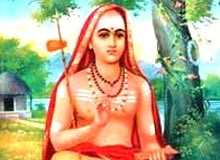The year 788 AD was a good one for Hinduism because Shri Adi Shankaracharya or the first Shankara was born in that year.

Adi Shankaracharya extraordinary reinterpretations of Hindu scriptures, especially on Upanishads or Vedanta, had a profound influence on the enhancement of Hinduism at a time when anarchy, superstition, and zealotry was unlimited.
Shankara restored the Vedic Dharma and Advaita Vedanta to its original purity and majesty because advocated the nobility of the Vedas and was the most famous Advaita philosopher of that time.
Shri Adi Shankaracharya, known as Bhagavatpada Acharya means that the guru at the feet of Lord. Started in the core teaching of Vedanta and Advaita or non-dualism for the mankind which is other from newness the scriptures, scavanged the Vedic religious practices of ritualistic excesses.
Childhood of Shankara
In 788 AD, In a village named Kaladi on the banks of the river Purna situated in the Southern Indian state Kerala Shankara was born in a Brahmin family. Sivaguru and Aryamba are the parents, had been childless for a long time and the birth of Shankara was a glad and blessed occasion for the couple because after many prayers they got a child. Legend has it that Aryamba had a vision of Lord Shiva and promised her that he would personate in the form of her first-born child.
Shankara was a unnatural child and was greeted as ‘Eka Sruti Dara’ wghich means one who can keep anything that has been read just once and tremain for last long. All the Vedas and the six Vedangas from the local gurukul, Shankara mastered in that and learned so fast from the epics and Puranas.
Seminal Works of Shankaracharya
The core of Shankara's perspective on Advaita considered the Brahmasutras Brahmasutrabhashya and Bhaja Govindam written in praise of Govinda or Lord Krishna a Sanskrit devotional poem that forms the center of the Bhakti movement are the most important of Shankaracharya's works.
Philosophy Of Shankaracharya
Shankaracharya teachings are based on the oneness of the soul and Brahman, in which Brahman is viewed as without any virtue.
through discourses and debates with other thinkers, Shankara travelled across India and other parts of South Asia to propagate his philosophy.

'Lord Brahma and men are of one essence and every individual should try to develop this vision of oneness.' was a major proponent of the Vedanta tenet.
Thanks For Reading!!!